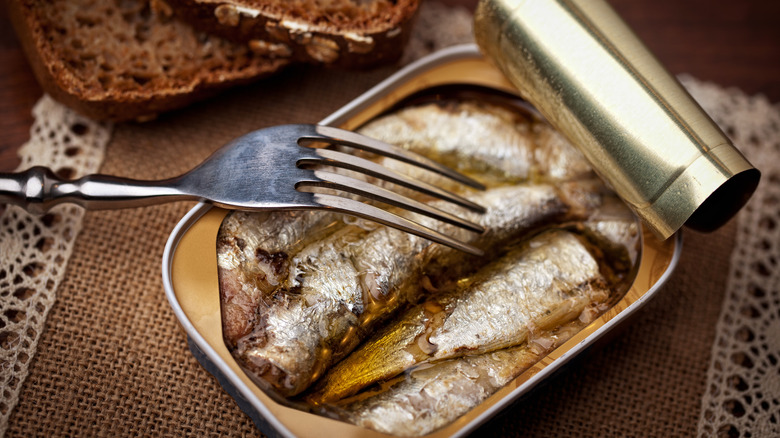This Unexpected Protein Can Prevent Kidney Stones (But Only If You Avoid One Added Ingredient)
While it doesn't get nearly as much hype as salmon or tuna, there's another protein source swimming around out there with an assortment of health benefits. In addition to being rich in omega-3s, potassium, zinc, magnesium, and a host of other essential nutrients (via Frontiers in Nutrition), this briny fish may also protect against the development of kidney stones, according to Harvard Health Publishing. Fair warning: it's definitely an acquired taste.
Canned sardines are loaded with calcium. In fact, just one standard 75-gram can of sardines contains 286 milligrams of calcium, according to the U.S. Department of Agriculture (USDA). Most people develop calcium oxalate kidney stones. But when we consume calcium through food sources, it binds to oxalate compounds in the gut. In doing so, this reduces the amount of oxalate making its way into the blood, then being filtered through the kidneys and dispersed into our urine. The lower the levels of oxalate in our pee, the less prone a person is to developing calcium oxalate kidney stones. However, purchasing sardine products that are canned with high amounts of added salt can work against our efforts to reduce kidney stone risk.
Avoid canned sardines that are high in added salt
Consumption of excess sodium boosts levels of calcium in our pee, which can increase the risk of kidney stones in those who are susceptible to the condition (via Harvard Health Publishing). Unfortunately, sodium tends to hide in a lot of canned foods. In that same 75-gram can of sardines we mentioned earlier, you'll find 230 milligrams of sodium (via USDA). In a 92-gram can of Atlantic sardines packed in oil and drained with the bones intact, this number jumps to 282 milligrams of sodium (via USDA). What's more, an 84-gram can of skinless, boneless sardines drained and packed in water comes with 348 milligrams of sodium (via USDA). While the current recommended daily limit for sodium is 2,300 milligrams, people who have a history of kidney stones are suggested to reduce their intake to 1,500 milligrams. However, the National Kidney Foundation recommends dialing back one's intake even further to no more than 1,000 to 1,200 milligrams of sodium daily to protect against calcium stones.
When picking out a can of sardines at the grocery store, registered dietitians Lauren Manaker and Jenny Shea Rawn told EatingWell that it's best to reach for canned sardines that are packed in a low-sodium brine. Additionally, Harvard Health Publishing suggests purchasing sardines with the soft, edible bones intact.
Why people prone to uric acid stones may want to avoid sardines
Although not as common as calcium oxalate stones, approximately 8% to 10% of all kidney stones are uric acid stones, according to 2020 research published in Primary Care: Clinics in Office Practice. For people prone to these kinds of stones, sardines may be best avoided altogether. Along with anchovies and shellfish, sardines are high in purines, a compound that increases uric acid production in the body, which then gets filtered through the kidneys and boosts the acidity of our urine, paving the way for uric acid stones to develop (via the National Kidney Foundation). Keeping one's intake of purine-rich foods low can reduce the likelihood of uric acid stones forming.
For people subject to calcium oxalate stones, however, enjoying a low-sodium can of sardines every now and again may work in one's favor, along with other various calcium food sources, such as milk, yogurt, and leafy greens. In addition to keeping the body hydrated, it is also suggested to minimize one's intake of high oxalate foods to help lower one's risk of kidney stones. To learn more, check out some other surprising health benefits of sardines.


